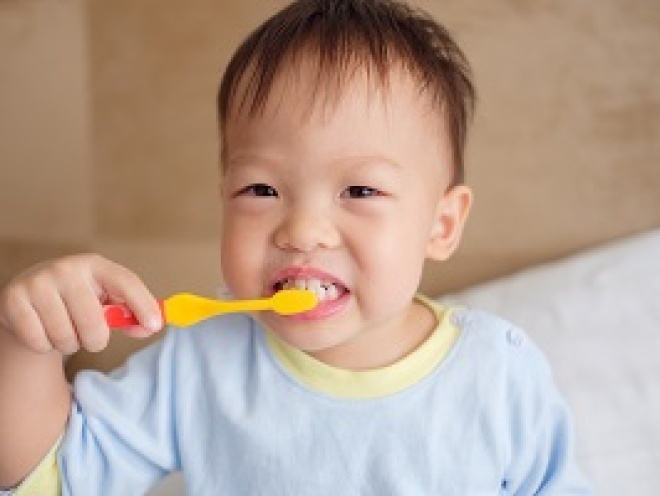They’ve got a tooth and it looks super cute. But hang on, now you need to look after it. Here’s our guide…
There’s no need to wait for your baby to have a full set of teeth. As you're sure they are teething, give them a toothbrush to chew on and start building brushing into their day. Hopefully, your baby will think it is all a new, fun game you are playing.
Why is it important to brush milk teeth?
Milk teeth play an important role in the alignment and spacing of your little one’s permanent teeth (Community Practitioner, 2011), as well as for eating and speaking (Vittoba Setty and Srinivasan, 2016; American Dental Association, 2022). Think of them as important placeholders.
Baby and toddler toothbrushes
At first it might be easier to clean their teeth with a piece of clean cloth on your finger (Oral Health Foundation, 2018). Or a handy finger toothbrush, usually made of silicone, might be easier to control to begin with.
Toothbrushes for young children have a small head and soft bristles (Oral Health Foundation, 2018). Babies have a tendency to chew the head of a toothbrush, so change it every three months or sooner (Oral Health Foundation, 2018).
Manufacturers of electric toothbrushes advise parents that these are only suitable once your child is three years old. So stick to a manual one for now.
Baby and toddler toothpaste
When it comes to brushing your child’s teeth, pick a specific kids’ toothpaste, as adult toothpastes might contain too much fluoride. It should still contain at least 1,000ppm (parts per million) of fluoride though as this helps prevent and control decay (NHS, 2018).
Use a tiny smear of toothpaste for babies and toddlers up to three years old.
Increase this once they are between three and six years old to a pea-sized amount (NHS, 2018).
How to brush baby teeth, and how often
- A helping hand: For babies, sit them on your knee and rest their head against your chest while you brush their teeth. When they’re older, stand behind them and tilt their head backwards.
- Brush their teeth at least twice a day: Just before bed and at any other time. Gradually build up how thoroughly you do it, so eventually you’re getting all of the surfaces of their little teeth, for two minutes ideally.
- Brush the teeth in small circles, covering all the surfaces: And encourage them to spit the toothpaste out afterwards, just like they see you doing. There's no need to rinse with water though, as this will just wash away the fluoride.
- Watch for them licking or eating toothpaste from the tube: It’s best to always supervise brushing when they’re little, probably even until they’re around seven years old.
(NHS, 2018)
My baby won’t have their teeth brushed – help…
Lots of children aren’t that keen on teeth brushing. Here are some handy tips:
- Don’t stress: If tooth brushing does not go quite to plan – some babies aren’t that receptive to having their teeth brushed at first – don’t worry too much. The important thing is that you start to make it part of their routine.
- Let them hold the toothbrush: If they feel more in control of things, they might be more into it.
- Make it into a game, or brush your own teeth at the same time: Then they can copy you – this can work from a really young age.
- Watch out for their wriggling: Supervision is key, a baby and a stick of plastic in their mouth could all end in tears if they fall forwards, so keep a close eye.
(NHS, 2018)
When do I need to take my baby to the dentist?
You get free NHS dental treatment for children so that’s a bonus. Take them with you when you go for your own dental appointments. That way they get used to the idea and then sign them up for their own appointments, as soon as they have some teeth. The sooner they get used to it, the more comfortable they’ll be at the dentist (NHS, 2022).
This page was last reviewed in July 2022.
Further information
Our support line offers practical and emotional support with feeding your baby: 0300 330 0700.
You might find attending one of NCT's New Baby groups helpful as they give you the opportunity to explore different approaches to important parenting issues with a qualified group leader and other new parents in your area.
Make friends with other parents-to-be and new parents in your local area for support and friendship by seeing what NCT activities are happening nearby.
You can read more about teething in our range of articles.
American Dental Association. (2022) Baby teeth. Available at: https://www.mouthhealthy.org/en/az-topics/b/baby-teeth [Accessed 22nd July 2022]
NHS. (2018) Children’s teeth. Available at: https://www.nhs.uk/live-well/healthy-teeth-and-gums/taking-care-of-chil… [Accessed 22nd July 2022]
NHS. (2022) Looking after your baby’s teeth. Available at: https://www.nhs.uk/conditions/baby/babys-development/teething/looking-a… 22nd July 2022]
Oral Health Foundation. (2018) How to look after children’s teeth. Available at: https://www.dentalhealth.org/Blog/how-to-look-after-childrens-teeth [Accessed 18th August 2022]
Oral Health Foundation. (no date) Children’s teeth. Available at: https://www.dentalhealth.org/childrens-teeth [Accessed 22nd July 2022]
Vittoba Setty J, Srinivasan I. (2016) Knowledge and awareness of primary teeth and their importance among parents in Bengaluru City, India. Int J Clin Pediatr Dent. 9(1):56-61. Available at: https://doi.org/10.5005/jp-journals-10005-1334




